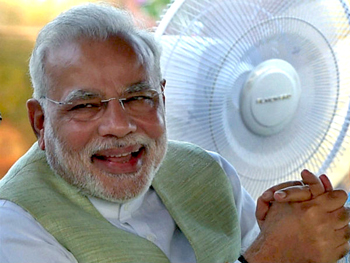 New Delhi, Dec 7: The Planning Commission today suggested to a group chaired by Prime Minister Narendra Modi that its replacement body should be structured to meet the need of changing economic paradigm and comprise sectoral experts and states' representative.
New Delhi, Dec 7: The Planning Commission today suggested to a group chaired by Prime Minister Narendra Modi that its replacement body should be structured to meet the need of changing economic paradigm and comprise sectoral experts and states' representative.
In her presentation before the group comprising Modi and chief ministers, Planning Secretary Sindhushree Khullar said that the new institution may have 8-10 regulars or executive members with half of them representing the states.
She suggested that the remaining members could be sectoral experts -- environmentalists, financial experts, engineers, scientists and eminent scholars from different fields.
The new body may be headed by the Prime Minister as the chairperson position would be ex-officio.
The meeting, convened by Modi to deliberate on replacement of the Planning Commission, is being attended by the several Chief Ministers, including Akhilesh Yadav (UP), Manohar Lal Khattar (Haryana), Devendra Fadnavis (Maharashtra) Vasundhara Raje (Rajasthan), Shivraj Singh Chouhan (Madhya Pradesh), Raman Singh (Chhattisgarh), Harish Rawat (Uttarakhand) and Oomen Chandy (Kerala).
West Bengal Chief Minister Mamata Banerjee is skipping the meeting. State Finance Minister Amit Mitra is representing the West Bengal.
Khullar in her presentation suggested that the new institution would have functions including monitoring and evaluation; programme project and scheme evaluation; cross-sectoral and inter-ministerial expertise and appraisal and monitoring of projects.
It is has been suggested that the new body would advise the Prime Minister on matters referred to it. Besides, it should act as think-tank and have network with universities and other institutions.
The new body could provide internal consultancy services to states and the Centre on different matters. It could also be used to design medium and long-term strategy.
The Prime Minister in his Independence Day speech had announced that the Commission, set up in 1950 at a time when government gave public sector the commanding heights of economy, would be abolished and replaced with a more relevant institution.
"We will very soon set up a new institution in place of Planning Commission...the internal situation of the country has changed, global environment has changed... We need an institution of creative thinking and for optimum utilisation of youth capability," Modi had said.
The Commission had held meetings with experts to discuss the structure of the new institution that would ultimately replace it.
Country's first Prime Minister Jawaharlal Nehru had set up the Planning Commission to steer the nation's economic course.
Set up by a Cabinet resolution, the Commission had enjoyed immense power and prestige as it had always been headed by the Prime Minister. Its most important function was to fix targets for sectoral growth and allocate resources to achieve them.





Comments
Add new comment